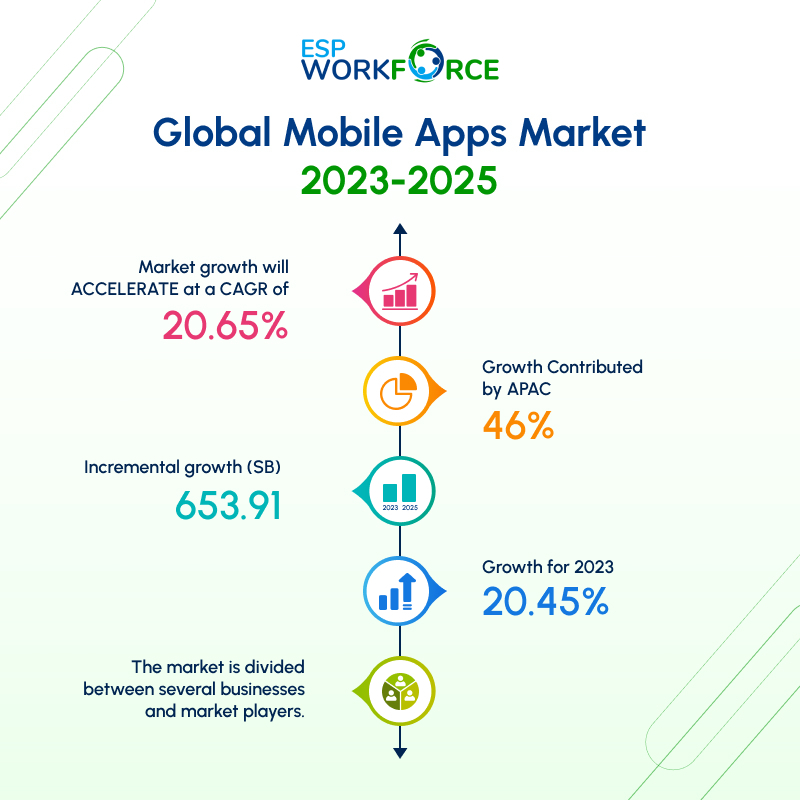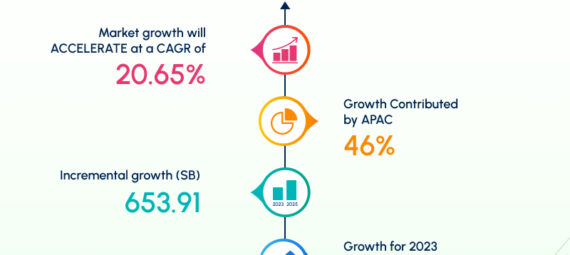Mobile apps have changed how brands and industries do business and the industry is growing fast with each passing day. Lots of new tools are coming up to improve the app development industry but, how to choose the right tools? This is something every app developer thinks when he begins a new project or just wants to add to their knowledge and skills.
At ESP Workforce, we understand how confusing it can be. That’s why we’re here to help! Our guide explains all these tools and what they do. As we are about to enter 2024, having mobile apps is more than ever essential for businesses.

It’s not just about making apps, it’s like a smart move for businesses. These apps can help businesses work better, make customers happier, sell more stuff, and even make the brand stronger online. Our guide will make it easy for you to pick the best tool for your business.
Top Android App Developer Tools – 2023 – 2025
Let’s explore the top mobile app development tools that empower businesses to enhance operations, boost profitability, streamline resources, and ensure consistent app performance.
React Native
React Native is a popular JavaScript-based framework for creating apps on both iOS and Android simultaneously.
Why Choose React Native?
- Utilizes a common codebase to build multi-platform apps, bypassing the need for Java or Swift/Obj-C separately for Android and iOS.
- Launched by Facebook in 2015, widely adopted by software development companies like Facebook and Uber.
- Key advantages include a growing community, reusable code for state management, robust third-party integration, and live code reloading for real-time updates.
Flutter
Flutter is an open-source SDK by Google, based on Dart, offering speed and extensive features.
Why Choose Flutter?
- Allows fast rendering of changes with the ‘Hot reload’ feature.
- Helps identify bugs early, simplifies widget development, and leverages existing codes for native functionalities.
- Supported by Google Firebase for robust backend, suitable for both large corporations and startups.
Xamarin
Xamarin is a top choice for making native apps. Since it’s from Microsoft, it’s pretty reliable against sudden service stops, security issues, and tech updates.
Lots of developers, over 1.4 million of them, use Xamarin. So, finding skilled folks for your app team won’t be hard.
Why Choose Xamarin?
- Uses the Mono framework to tap into all the device’s features.
- Makes coding easier with platform-specific IntelliSense.
- Helps with app indexing and deep linking.
- Makes it simple to build, test, and put your app out there using C++.
- Supports things like enterprise or social logins, push notifications, and offline use.
- Can make powerful shared libraries.
Ionic
Ionic is widely used for building hybrid apps thanks to its open-source SDK, making use of CSS, HTML5, and similar SASS technologies. Developers using Ionic can easily send updates directly to users once the mobile app is built.
What makes Ionic special is its ability to automate app delivery. With this capability, developers can quickly deploy new features and fixes, speeding up the whole app development process.
Why Choose Ionic?
- Sends updates, bug fixes, and content changes straight to users without needing MDM or app store approval.
- Streamlines workflow automation, from making native app versions to quality assurance (QA).
- Cloud-based creation of native app files using the Ionic package.
- Offers a shared dashboard with real-time activity updates.
- Provides default settings and pre-built workflows for automating development tasks, tailored for different industries.
jQuery Mobile
jQuery Mobile is an HTML5-based UI system built on jQuery, offering various UI elements specifically designed for mobile apps. For creating modern web apps on mobile and tablets, jQuery Mobile stands out as a go-to tool.
This platform enhances web pages by adding touch-friendly form inputs, ensuring faster page loading, and supporting a wide range of devices. Its efficiency lies in its lightweight code, providing adaptable designs.
Why Choose jQuery Mobile?
- Developers can create entire app interfaces in HTML with minimal JavaScript code.
- Streamlines complex code structures into concise lines using Ajax.
- Offers robust support for devices lacking JS functionality.
- Ensures app accessibility across various devices and browsers.
- Effortlessly animates page transitions using jQuery Mobile’s transition events.
- Provides a collection of simply styled, touch-friendly form elements.
- Offers extensive customization options with cross-platform widgets and Themeroller for elevated UI and Theming.
Sencha Ext JS
Sencha Ext JS is a rapid mobile app development tool ideal for creating native apps compatible with the latest iOS and Android versions. This MVC-based JavaScript framework streamlines app development, boosting responsiveness and ease of use. With Sencha, developers proficient in HTML5 mobile app development can seamlessly craft apps for both Android and iOS platforms.
Why Choose Sencha?
- Integrates over 115 fully supported components with various frameworks like Angular and FOSS.
- Commercially supported UI widgets for menus, toolbars, and lists.
- Comprehensive end-to-end testing solution.
- Reduces dependency on multiple libraries and versions, ensuring a consistent code paradigm across all components.
- Benefits from a strong community support base.
Framework 7
Framework 7 specializes in crafting native iPhone applications and has recently extended its support to Android apps as well. This open-source mobile HTML framework stands out for its simplicity, making native app development faster and more accessible. It’s a go-to choice for esteemed iPhone app development companies undertaking mobile app projects.
Why Choose Framework 7?
- Uses a straightforward HTML layout coupled with CSS framework and JS files.
- Offers iOS-specific UI elements, visualizations, animations, and touch interactions.
- Provides a variety of ready-to-use UI elements and widgets like list views, media lists, modals, popups, and form elements.
- Supports iOS swipe-back action from the left screen border.
- Allows customization with unique styles for your applications.
- Enhanced video ad experiences through collaboration with vi (Video Intelligence).
Onsen UI
Onsen UI stands as a valuable tool for building Progressive Web Apps (PWAs) and hybrid apps for mobile devices. Offering a diverse array of UI components specifically tailored for mobile devices, Onsen UI allows developers the flexibility to build apps with or without JavaScript. This framework’s adaptability makes it a favored choice among mobile app developers.
Why Choose Onsen UI?
- Provides an easy learning curve, enabling rapid uptake by developers.
- Simple setup based on HTML, CSS, and JS.
- Offers ready-to-use UI components such as toolbars, side menus, tabs, lists, and forms.
- Doesn’t require strict installation of Android SDK or iOS, allowing swift coding and app building.
- Strong support for command-line tools like Monaca, facilitating hybrid app development.
- Supports integration with AngularJS, React, Vue, and jQuery for enhanced functionality.
Unity
Unity is an acclaimed game development tool that is used by millions of developers to create gaming apps across various platforms like Android, Windows, and iOS. It is known for its streamlined workflow, friendly user interface (UI), and extensive feature set. It is a leading game player on the Android platform.
While primarily tailored for gaming apps, Unity proves effective in crafting non-gaming apps for diverse sectors like businesses and utilities.
Why Unity Stands Out?
- Swift and simplified development support expedites the app development process.
- Relies on C#, simplifying coding complexities.
- Strong code support facilitates quick app expansion.
- Scalability across different devices.
- Optimal performance, even with large-scale apps.
Moreover, it has a robust community, including developers from industry giants like Disney, NASA, Ubisoft, Microsoft, Electronic Arts, and Warner Bros.
Ot-Creator
Qt-Creator, a cross-platform IDE, offers tools for various tasks such as source code editing, testing, integrated GUI layout, and visual debugging.
Why Consider Qt-Creator?
- Quick integration with external SDKs like AWS and PayPal.
- The declarative syntax for flexible and complex user interface composition.
- Simplified property binding approach for easier modifications.
- Features encompass touch-based inputs, shader effects, controls, and animations.
- Powered by C++, enabling interaction with native APIs.
- Equipped with the Qt Quick test framework for accelerated testing.
JetBrains Rider
JetBrains Rider, a cross-platform .NET IDE built on the IntelliJ Platform and ReSharper, prioritizes developer productivity and understanding of .NET languages and technologies.
Why Choose JetBrains Rider?
- Enables building .Net, Xamarin, and Unity apps for diverse platforms.
- Offers comprehensive editing and code insight across multiple programming languages.
- Leverages powerful features of the IntelliJ platform.
- Detects errors in compilation and runtime operations promptly.
- Encourages optimal design and development practices, reducing redundancy and enhancing coding.
- Equipped with intelligent navigation and search options for swift code access.
- Features a rich plugin repository offering various plugins for extended functionalities.
All these mobile app development tools offer specific benefits and when choosing any of them, you should consider your requirements first. Other than these. we have also given additional tools below that are divided according to categories – android app development tools, iOS app development tools, and cross-platform app development tools.
Also Read: What is mobile application development
Android App Development Tools and Software
- Android Studio
- Android Debug Bridge
- Android Virtual Device (AVD)
- Firebase Tools
- Buddy
- Swiftic
- Eclipse
- Appypie
iOS App Development Tools and Software
- Xcode
- Fabric
- Parse
- CodeRunner
- Jamf Pro
- AppCode
Cross-Platform App Development Tools and Software
- React Native
- Flutter
- Ionic
- Xamarim
- NativeScript
- Adobe PhoneGap
- Sencha Touch
- Titanium SDK
When it comes to making mobile apps, there are loads of tools out there, some are free, and some you need to pay for. These tools help in creating and launching apps, but figuring out which ones to use can be tricky. One way to find the right tools is by doing your research. Try different tools, read what people say about them, talk to other developers, and see which ones suit you best.
Or, you could check out a platform like ESP Workforce. Our remote developers are reliable and once you place the order, we will assign a suitable developer to your project. We know that every project is different, so we make sure that your developer is an expert in working on projects like yours.
